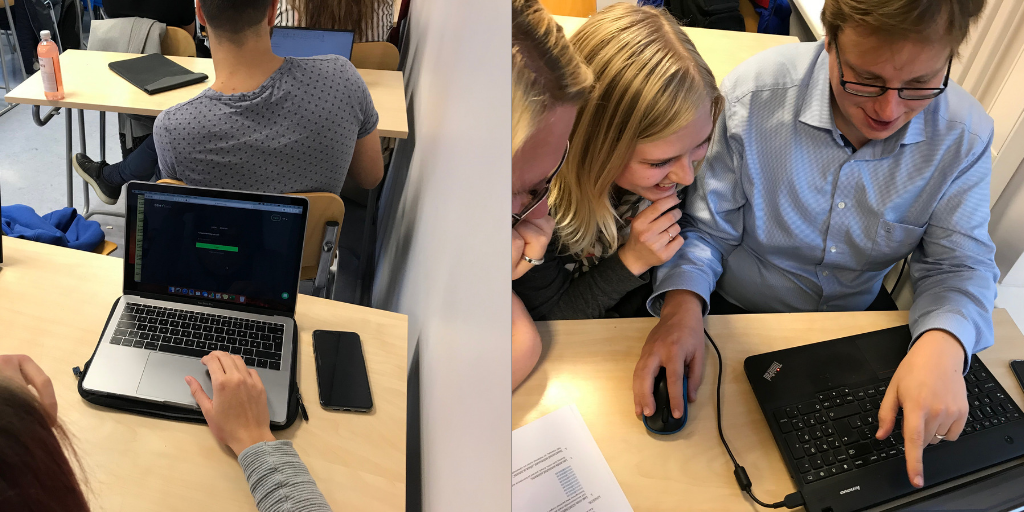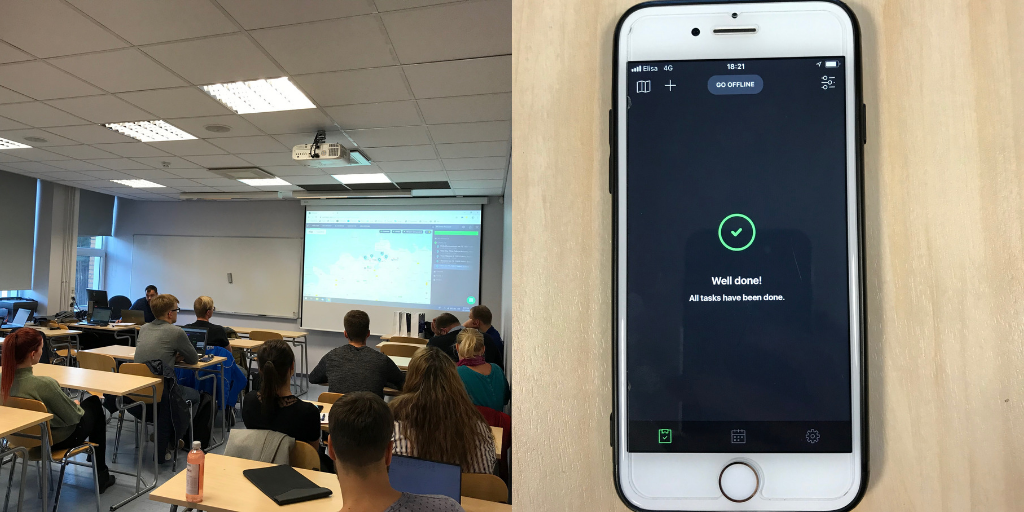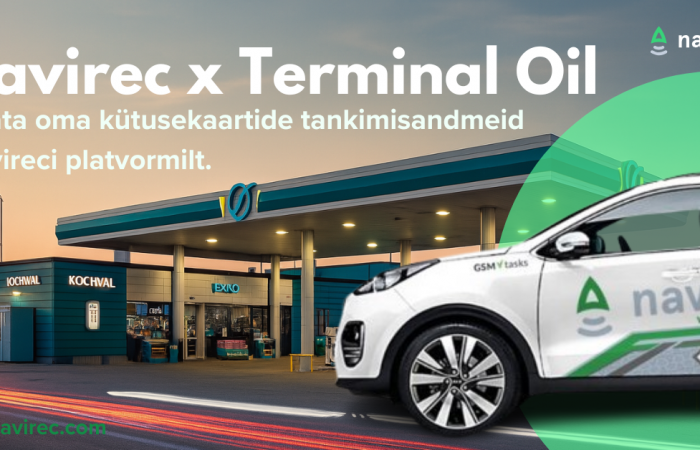Navirec and GSMtasks intensifies cooperation with universities

News about the promotion of cooperation between universities and companies and the related bottlenecks has been widely covered in recent years in both media publications and university blogs.
There is more talk about the importance of cooperation in shaping sustainable entrepreneurship and making learning practical.
Plus, not only provide a valuable theoretical basis for students from the school but also offer experience stories of specialists in their field, to test their skills within practical tasks.
Let’s cooperate?
Last year, the Estonian logistics solution and its affiliate GSMtasks, contacted Estonian universities. The company aimed to identify opportunities for beneficial long-term cooperation for both parties.
The logistics institutes of TalTech and the TTK University of Applied Sciences showed great interest to jointly develop both the Estonian educational landscape and the economy.
Today, in addition to offering guest lectures and internships, professional scholarships have been issued. The aim was to use Navirec and GSMtasks as a logistics and work management software as a teaching tool within school logistics laboratories.
The nature of universities and companies is changing
Mutual benefits are nothing new for universities and companies to grow together. It is now a joint facet of modern business society.
The study “Monitoring the cooperation experience of companies and higher education institutions” published by researchers at the University of Tartu explained how we are entering the third generation of research institutions.
Universities are no longer collectors and preservers of knowledge separated from society, but increasingly integrating into economic and social life.
Universities have become critical parts of the innovation system, actively participating in the development of companies and taking their needs into account in their activities.
Innovation management expert Indrek Tammeaid describes the current challenges of the business field in Äripäev, explaining how companies must continuously find newer smart ways to develop better products.
Here, the university can offer support from, for example, product and service development, as it has the necessary research and analysis capabilities.
At the same time, research institutions help to increase the competitiveness of companies and build a positive image of themselves as a crucial economic developer in society.
Success is based on common goals
As in all respects, cooperation produces the desired results if there are understanding and consideration of each other’s wishes.
It can take years to build mutual trust and, in the initial phase of cooperation, much time for meetings and joint brainstorming to find out the goals of both parties, and the capacity to achieve them.
According to Kati Nõuakas, Head of the Transport and Logistics Curriculum at the Institute of Logistics of Tallinn University of Technology, their main goal is to provide the university with crucial practical input in communication with companies.
“Our university wants to expand cooperation with companies and develop existing relationships precisely to bring real practices and practical tasks today teaching,” explained Nõuakas.
Jelizaveta Janno, Logistics Program Manager at TalTech Faculty of Engineering, also emphasizes the practical aspect of cooperation expectations and points out its importance in supporting academic learning, regardless of the level of study.
As a TalTech Logistics Master’s students do not always have a bachelor’s degree in logistics, it’s good that the students are taught vocational skills from industry professionals from logistics companies – providing an invaluable insight into working within the logistics sector in the future.
Navirec and GSMtasks view higher education institutions as valuable partners, with the help of which it’s possible to give a boost to product development as well as other aspects.
This is done both through joint research and by receiving direct feedback from the students themselves.
“In addition to sharing customer stories with students, their experience has also accumulated valuable information from internships to real workplaces as a logistics manager. Based on this, we can improve existing products,” explains Grete Jeltsov, the Marketing Manager of Navirec and GSMtasks.
From theory to practical experience
At the beginning of the cooperation, it was decided to first try it out with guest lectures and internships only to students majoring in logistics.
The experience was positive and confirmed the desire of all parties to further deepen cooperation in the new academic year.
Students from several specialties as well as master’s students were involved in the guest classes next year.

Workshops introducing logistics and work management software were held at Tallinn University of Technology within the framework of the third year of the specialty of logistics and the first year of the specialty of transport and traffic management in the field of transport economics.
In particular, the aim was to introduce both new entrants and upcoming alumni to the opportunities available on the market for optimizing transport processes and managing machinery more economically.
The guest lecturers are specialists in their fields who work with transportation companies and others, managing larger and smaller fleets daily. Their goal is to help them control the company’s expenses with smart software and manage various processes more efficiently and conveniently with smart software.
“We shared customers’ experiences with the students about using our software and wanted to give vital examples of companies working in different fields. We also wanted to show how versatile the solution can be put to work,” explained Jürgen Levandi, Navirec’s Sales Manager.
Hands-on studying
Each student logged in to the demo version of Navirec to become acquainted with its application possibilities. Under lecture guidance, students had to solve several practical tasks; for example, the creation of reports to analyze fuel costs.
The Navirec maintenance module was introduced, in which vehicle maintenance times were entered based on, for example, engine operating hours and odometer values.
Also, students learned how to set automatic notifications for maintenance, discussed how it is possible to significantly extend the life of the vehicle fleet within a given organization, and thus save costs.

Navirec’s customers include companies that use hundreds and even thousands of cars daily, so finding even the smallest savings can save the company six significant sums.
According to Levandi, it is essential to share customer success stories with students because they have the opportunity to learn from the experience of others and immediately apply this knowledge when starting work.
TalTech’s master’s students in logistics were tested for an even more practical lesson this time.
After the introduction of the GSMtasks task management solution, the course was divided into two groups – the first included logistics managers and the second couriers. The city had previously distributed consignments that had to reach the right destination before the end of the class.
The task of the logistics managers was to create work orders in the solution with the right additional information and to distribute them among the couriers. It was also essential to optimize routes and tasks so that all couriers could return to the university building on time.
Thus, the practical work imitated a real working day, during which the logistics company optimizes its workforce so that all customers can be served and employees end their shifts on time.
According to the universities, the students’ feedback on the lessons has been very positive. Both proper preparation and the ability of guest lecturers to contact the auditorium were praised.
From guest lectures to scholarships and joint research
The universities jointly confirmed that cooperation in the form of lectures and workshops could undoubtedly continue, as students see the company as a practical partner and a valuable communicator.
In the future, both parties wish to continue working together and are even planning to carry out various projects, or why not also thesis.

Jelizaveta Janno mentioned the enormous potential of companies’ experience and skills to contribute to the advancement of science.
“Many international research projects today are no longer purely scientific and comprehensive. By developing a theoretical concept, they also require a strong innovation aspect, plus the creation of a certain application. TalTech Logistics’ vision is to cooperate at the scientific level, which is mutually beneficial,” she explained.
In autumn, Navirec and GSMtasks announced a scholarship of 1,000 euros for the second-year students of the Transport and Traffic Management specialty of the TTK Institute of Logistics. The award will provide additional resources to motivate higher education students.
“The cooperation of the scholarship provided an opportunity to introduce students to logistics management solutions and touch a common goal with the company to have a high-quality workforce in the future. The scholarship motivates further students to make an effort to become a scholarship holder themselves,” said the head of the institute.
According to the marketing manager of GSMtasks, the personal interests of the company also play a role in issuing scholarships and sharing their knowledge and practical experience with students.
“For our part, we want to support research and higher education as much as possible, so that future logistics and transport managers are even more aware of the various ways to manage the labor of their companies more economically and efficiently when entering the labor market. This is important both for us and for the industry as a whole,” explained Jeltsov.
Universities taking part in this cooperation recommended other higher education institutions to find suitable companies to make the learning process more comprehensive and obtain the opportunity and time to implement common goals with them.
The theoretical side should be combined with practice at the latest in high school to give the university entrant an initial idea of the real nature of the field of interest to them.
It would also help to make more informed choices in the choice of specialty and significantly reduce the drop-out rate in academia due to the unsuitability of current theoretical courses.

